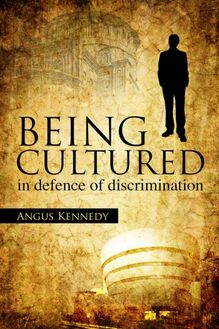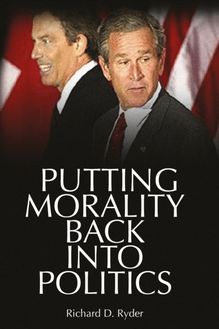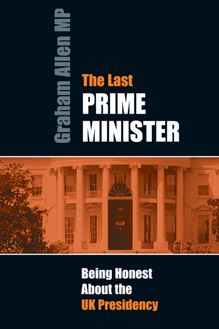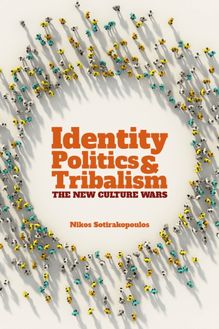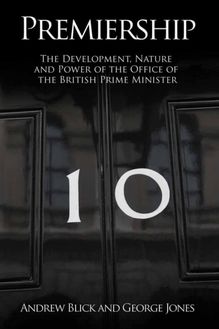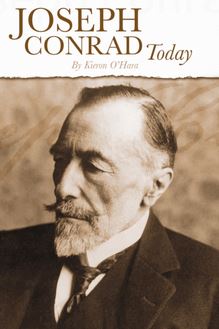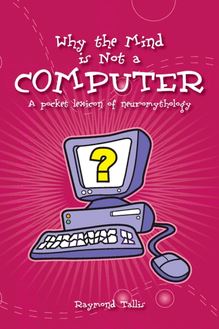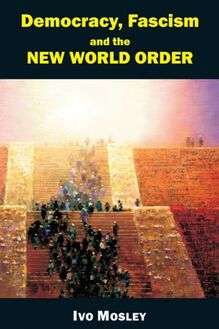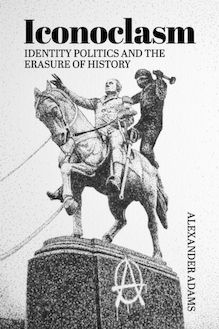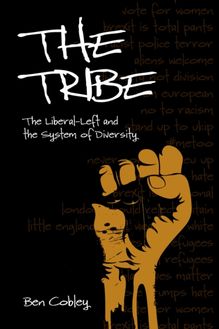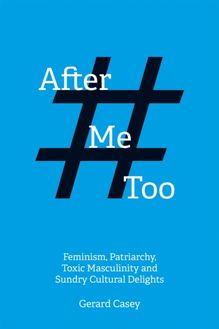Putting Morality Back into Politics , livre ebook
72
pages
English
Ebooks
2016
Vous pourrez modifier la taille du texte de cet ouvrage
Obtenez un accès à la bibliothèque pour le consulter en ligne En savoir plus
Découvre YouScribe et accède à tout notre catalogue !
Découvre YouScribe et accède à tout notre catalogue !
72
pages
English
Ebooks
2016
Vous pourrez modifier la taille du texte de cet ouvrage
Obtenez un accès à la bibliothèque pour le consulter en ligne En savoir plus
Putting Morality Back Into Politics
Richard D. Ryder
SOCIETAS
essays in political
& cultural criticism
imprint-academic.com
2016 digital version converted and published by
Andrews UK Limited
www.andrewsuk.com
Copyright © Richard D. Ryder, 2006, 2016
The moral rights of the author have been asserted.
No part of any contribution may be reproduced in any form without permission, except for the quotation of brief passages in criticism and discussion.
Imprint Academic, PO Box 200, Exeter EX5 5YX, UK
Introduction
The rules of the game are changing
Tony Blair, BBC Panorama, 9 October 2005
Contemporary Western politics often lacks two things: a moral theory and a respect for the facts. Power, party and pragmatism have become paramount and spin more important than substance. Remnants of respect for the ideals of democracy, human rights and liberalism remain but these are often vaguely defined and inconsistently applied. Is it possible to rediscover or redefine some clearer sense of moral purpose in politics? To increase its concern for truthfulness and to base it upon some transparent moral objectives? The moral vacuum in Western politics today all too easily could be filled by blind patriotism, religious fundamentalism, commercialism or naked power. This book is not merely a call for maintaining standards in public life. It suggests that morality and truth-seeking should be put back into the very foundations of politics. This is not a plea for a hidden agenda, for any sort of dogmatism or for any absolute idealism. It is simply a request that political policy should be based, not upon mere opinion, nor upon a set of knee jerk reflexes, but upon a scientific concern for the facts and an intelligent and open moral argument.
I suppose my own interest in political philosophy goes back to childhood. There were times when I felt so oppressed by those around me that I tried to work out how the situation ought to be put right. At boarding school I found myself in a police state in miniature. The supreme authorities were the teachers or, significantly, the ‘masters’, as they were then called. Their police force was the prefects who enforced a rigid set of rules with draconian corporal punishment. The regime was authoritarian and hierarchical, inculcating the militaristic virtues of mental and physical toughness and obedience to command. The traditional principles of liberty, equality and democracy were ignored. Indeed, inequality was enforced through a system of petty privileges; the sixth former could walk upon the lawn and have one hand in his pocket, the prefect could use an umbrella, the head boy could have a beard, a wife and two children - while the wretched new boy had no privileges at all! Only ‘justice’ was given some sort of respect - but this was a justice that was defined and administered entirely by those in power, and without appeal. We, the subjects of this totalitarian mini-state, participated in no political debate about the running of the school, nor were we permitted any votes in determining how policy should be administered. In daily Anglican chapel services we were subjected to selective Christian indoctrination; our virtues were to be fortitude, self-discipline and obedience to authority. There was no separate legislature, no independent judiciary, only an unyielding and unelected executive that controlled every moment of our lives. Such a situation caused great misery and fear for many of us. Some, however, prospered under these conditions; those who were exceptionally robust and those who toed the line. Others cracked mentally and disappeared. A few became rebels, some clandestinely and some more openly; this is one of the many paradoxes of the traditional British public school system - it has produced not only the great conformers but also some of the reformers of society. None of us were to be uninfluenced throughout our lives by these few traumatic years. Eventually, when I became a prefect in this little police state, I tried, rather ineffectually, to put some revolutionary ideas into practice. What, I asked myself, was the purpose of the school regime? A ‘good education’? But what did that mean? As hard as I looked I could not see a clear moral vision on which school rules and policies were established, nor any body of hard factual evidence to support them.
This book proposes re-inserting moral principles into politics. I suggest these could be Utilitarian, Kantian, Aristotelian, Rights Theory, post-Christian or something new; the important point is that they should be argued clearly, open to dissent, and applied more or less consistently. Currently, it is impossible to debate political morality with most politicians because they do not have a coherent moral position. Instead, they utter an odd assortment of moral clichés and assumptions. While paying lip service to human rights, for example, they nevertheless tend to assume that the moral goodness of a policy depends upon the total number of people who benefit from it, often overlooking the interests of the individual. My own moral position (painism) attempts to reverse this trend, claiming that it is only the individual that matters (Ryder 2001), and holding that the suffering of individuals should be our chief moral concern. As we shall see, this challenges democracy’s main weakness - its so-called ‘tyranny by the majority’. I believe that underlying all the traditional aims of politics - the attainments of liberty, equality or justice (which are analysed in detail in part 1) - is the search for happiness. Indeed, I would say that happiness, however unpopular the word itself may have become, should, nevertheless, be the real aim of politics. The wellbeing of the individual still faces two great political threats: the threat of the democratic majority and the threat of the state itself, whether or not it is democratic. Both threats must be challenged if the happiness of the individual is to be secured.
If politics is about helping individuals to be happy then it needs to find out from psychology how to do this. This is just one instance where science should play a greater role in establishing the facts in politics. There is a common failure to base political policies upon scientifically established truths. Most of the claims of political philosophers, too, have been untested scientifically. We may breezily assert that justice leads to freedom or that equality leads to justice, and a host of other things, but these claims are rarely tested scientifically, although some now could be.
My own experience of politicians at national level is that most of them are exceptionally decent people, although under far more searching moral scrutiny than are most of us, and far more likely to face angry charges of moral inconsistency, hypocrisy and mendacity. Nevertheless, we live in an age that is suspicious of politics. Over the last twenty years an average of only 18% of the British public have believed that politicians generally tell the truth. Why is this? Is this the fault of the politicians themselves or the media? Surely it would help if we knew what the politicians are really trying to achieve. This would increase their credibility. But we listen to them in vain for a convincing, coherent and consistent philosophy underlying their day to day manoeuvres. What we do find is ‘sleaze’ and a growing bureaucracy - a ‘nanny state’ that, with the proliferation of street CCTV cameras, the proposed introduction of identity cards, telephone-tapping, the politicisation of the police and new antiterrorist legislation, increasingly resembles George Orwell’s nightmare vision; worst of all, we see an increasing toleration of the practice of torture. There is a strange post-Marxist notion in the air that politics and morality should be disconnected. Even stranger is the idea that their disconnection is both necessary and, in some way, right. This book challenges all these assumptions. Idealism itself can become dangerous. But going too far in the other direction, towards relativism, amoral expediency and opportunism, is equally perilous.
When Niccolo Machiavelli published Il Principe in 1513 he contested the then accepted Christian virtues by urging that rulers could use both force and fraud to protect the stability of the state and the welfare of its citizens. He argued that such laudable ends justified immoral means in a world where corruption and violence already prevailed and where entirely virtuous tactics were bound to fail. In effect, Machiavelli tried to take morality out of politics. So powerful has been the influence of Machiavelli’s advice that, to this day, politicians and political philosophers frequently seem to assume that politics, because of its impact upon the lives of so many, not only allows, but rightly requires, violations of normally accepted moral standards. Of course, when faced by a Hitler or a Stalin, polite tea-table agreements count for little, and force and deception may become necessary. But this does not mean that moral considerations should be avoided. Quite to the contrary, it is precisely because of the gravity and the far reaching effects of politics that morality becomes exquisitely important. The lives and happiness of millions are at stake. It has been argued that in politics temptations to lie, steal, betray or even kill are far more compelling than in private life. But even if this is true, it is surely not a justification for throwing overboard all the usual moral scruples. If politics is often more morally testing than ordinary life, then this merely underlines why the relationship between morality and politics should be a close one.
Over the centuries, despite Machiavelli, politicians in Europe continued to justify their policies upon religious grounds: both sides in a war, for e

